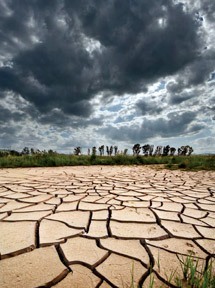Large areas of Earth drying up: study
Mainly due to climate change, large swaths of Earth have been drying
up, posing a threat to the ecosystem, a new study revealed.
The drying areas are mainly in the Southern Hemisphere, including
large parts of Australia, Africa and South America, according to the
study conducted by researchers at Oregon State University.
|

Climate change affects earth |
In large portions of the world, soils are now becoming drier than
they used to be, releasing less water and offsetting some moisture
increases elsewhere, said the study published in the issue of the
journal Nature.
The study is the first major one of its kind to look at the movement
of water from the land to the atmosphere, called 'evapotranspiration,'
on a global scale.
Most climate models have suggested that evapotranspiration would
increase with global warming, because of increased evaporation of water
from the ocean and more precipitation overall (water that can
evaporate).
Because the data only goes back for a few decades, the researchers
say they can't be certain whether the change is part of the natural
variability of climate or part of a longer-lasting global change.
One possibility, though, is that on a global level, a limit to the
acceleration of the hydrological cycle (the transfer of water between
land, air and sea) on land has already been reached. If that's the case,
the consequences could be serious.
They could include reduced terrestrial vegetation growth, less carbon
absorption, a loss of the natural cooling mechanism provided by
evapotranspiration, more heating of the land surface, more intense heat
waves and a 'feedback loop' that could intensify global warming, the
study said.
"We didn't expect to see this shift in evapotranspiration over such a
large area of the Southern Hemisphere," said study co- author Beverly
Law, a professor of global change forest science.
"It is critical to continue such long-term observations, because
until we monitor this for a longer period of time, we can't be sure why
this is occurring."
Meanwhile, more thorough sea level monitoring is needed to protect
one trillion dollars (0.98 trillion U.S. dollars) worth of the world's
infrastructure threatened by climate change, an Australian leading ocean
scientist said.
In the book 'Understanding Sea-level Rise and Variability,' released
recently, Australia's Commonwealth Scientific and Industrial Research
Organization (CSIRO) oceanographer John Church said the best way to
predict the impacts of climate change is to look at the sea.
"The oceans are absolutely central to climate change," Church told
Australia Associated Press.
"If we want to predict climate change accurately we've got to look at
the oceans and for that matter the ice sheets."
Dr Church said there are around one trillion dollars (0.98 trillion
U.S. dollars) worth of infrastructure, and 140 million people living a
metre or less above sea-level, and therefore, the sea-level data is very
important.
"These coastal areas - the infrastructure and the environment - are
already affected by extreme events," Dr Church said.
"With no significant greenhouse gas mitigation to date, it's becoming
increasingly clear that we need to adapt to rising sea levels." - Xinhua |



